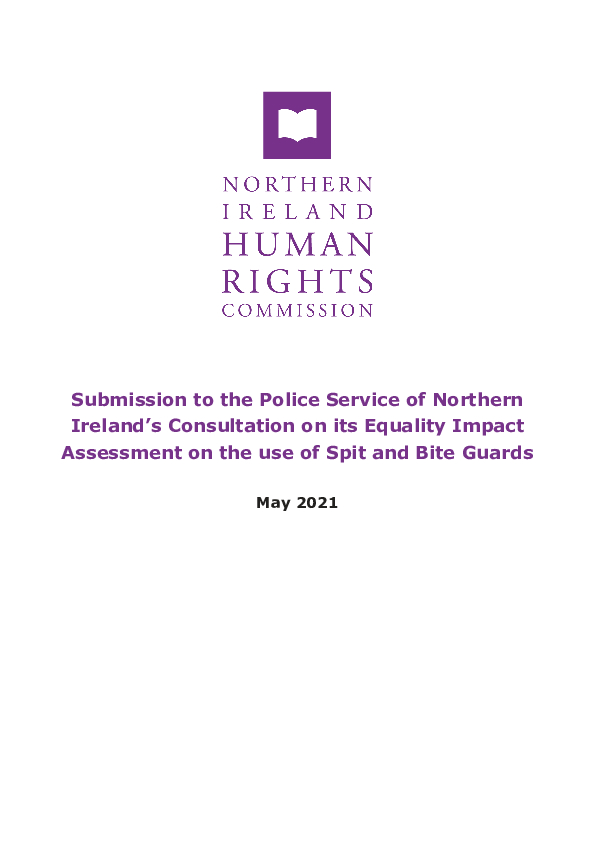NIHRC Submission to the PSNI Consultation on its Equality Impact Assessment on the use of Spit and Bite Guards
Last Updated: Tuesday, 25 May 2021
Date produced May 2021.
Below is a summary of the recommendations.
You can also download the full document through the links provided.
The NI Human Rights Commission (NIHRC):
- 2.16 Recommends that, in line with a recommendation by the NIPB, spit and bite guards should be withdrawn by the PSNI and officers should be provided with appropriate PPE as an alternative.
- 2.21 The NIHRC advises that other methods of dealing with individuals who may spit or bite, such as more robust Personal Protection Equipment or restraint holds are available to the PSNI as an alternative to spit and bite guards.
- 2.22 The NIHRC recommends that PSNI officers are trained in de-escalation techniques as an alternative to Spit and Bite guards. Given the EQIA identifies that most Spit and Bite guards are used on young males, a neurobiological element to the training would be useful.
- 2.34 The NIHRC recommends that Spit and Bite guards should not be used on any child under the age of 18.
- 2.35 The NIHRC recommends that the PSNI develop and put in place robust safeguards to limit the possibility that a child under the age of 18 is mistaken for someone who has reached adulthood.
- 3.2 The NIHRC recommends that, if the enhanced roll out of spit and bite guards is to continue, they should only be used as a last resort, when all other options have been exhausted. Any use of such force should be guided by the principles of proportionality and necessity.
- 3.7 The NIHRC recommends that the PSNI continues to carefully monitor and record information around religious background to ensure that there is no differential or adverse impact based on community background.
- 3.8 The NIHRC recommends that, where an individual on whom a spit guard is used refuses to identify with a religion or where the religion remains unknown, the PSNI could utilise the Residuary Method to make an informed assumption as to the individual’s potential community background.
- 3.13 The NIHRC advises that, data collected on the use of spit and bite guards on children should be disaggregated by other characteristics including racial and community background, disability or mental health conditions.
- 3.14 Any policy governing the use of spit and bite guards on children under 18 should be produced in consultation with children and young people in line with Article 12 UNCRC.
- 3.18 The NIHRC recommends that the PSNI create a target education campaign directed at younger people, particularly males, to outline unacceptability of spitting and biting, the dangers involved and legal ramifications alongside the PSNI’s policy on the use of Spit and Bite guards.
- 3.28 The NIHRC recommends that data on the use of spit and bite guards in relation to disability is disaggregated into different types of disability.
- 3.29 The NIHRC recommends that disability rights groups are engaged in the formation of policy in relation to the application of spit and bite guards on persons with disabilities.

Your browser is out-of-date!
Update your browser to view this website correctly. Update my browser now